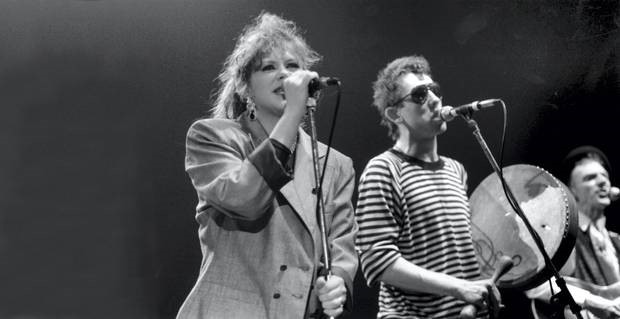“You scumbag, you maggot, you cheap lousy f****t.”
For years, debate has raged over whether the use of the word ‘faggot’ in The Pogues’ Christmas song Fairytale of New York. Many think the word should be censored due to its use as an offensive slur against homosexual people. While many people think that it is such a classic that there is no need to censor it.
Pogues’ singer Shane MacGowan has even weighed in on the argument stating that he would be fine with the word being censored. However, he did want people to know that he wrote the lyrics with the character in mind. MacGowan stated that he used the word because it fit with the character that Kirsty MacColl was portraying in the song. “She is not supposed to be a nice person, or even a wholesome person… Her dialogue is not intended to offend!”
MacGowan’s argument for the use of the controversial word makes sense if you look at it in terms of a character. Hear me out here, if Fairytale of New York were a film revolving around a homosexual character and a homophobic character used said word against the main character, we would be shocked as an audience, but we wouldn’t complain about it, because the actor is simply playing a cruel villain. MacGowan is simply applying this same logic to his song. Kirsty MacColl is not singing as herself, she is playing a character. But any film that uses the word would still have some sort of rating that would signify it contains offensive language.
The British Board of Film Classification state on their website that when rating a film, they consider the context of the word as well as the word itself. Based on this, surely his pretend film version of the song that I mentioned before would get at least 15 rating for the use of offensive language in the context that it is used? So, despite the fact that the word would not be censored, it would still be made clear that it’s being used in an offensive and abrasive way and would be rated accordingly. The radio is not rated in such a way and not censoring the word does mean that younger children, who should traditionally should be protected from such words, and those who find the word offensive would hear it on a day-to-day basis over the Christmas period.
But, even if you agree with this ‘character’ based approach, you can’t ignore the stigma around the word. The word ‘faggot’ has been used as a homophobic slur for years and many thinks that allowing it to be played on the radio with no form of censorship paves the way for it to be normalised as a normal everyday word. Those on social media have drawn parallels between the use of the homophobic slur and the ‘n-word’ which is happily censored on the radio due to its offensive nature. It is also happily accepted that those who are Caucasian shouldn’t not say the n-word due to the historical connotations. This all makes sense. The question is, why should people be able shout and scream along to the word ‘faggot’ when its use as an insult has caused so much hurt?
Presenter Stephen Byrne took to twitter to voice his opinions on this matter. “I was in a club the other day and they played that song, I stood in a room as over 200 people screamed a word that’s been used to make me feel like an outsider, with such joy and cheer.” He went on to say that it wasn’t the lack of censorship that offended him so much, but the lack of appreciation as to why some people would be offend and hurt by the word.
People clearly seem divided on the debate. Look at the replies of any tweet/Facebook post/whatever concerning the topic, and you’ll see people backing both sides. I must admit, as a gay guy, I didn’t have much of an opinion on the topic until a couple of nights ago. I can see where both sides as coming from, but I personally don’t think the argument that the song is too ‘classic’ to censor is a strong enough argument. Having been in club in Nottingham, much like Stephen Byrne, and hearing the people around me gleefully scream the word ‘faggot’ didn’t bother me too much. I don’t know whether that is me being personally insensitive to the word, or what. But what bothered me was that people began to use the word ‘fag’ after the song played as if it was a word that was suddenly okay because a DJ deemed it appropriate to play out loud. A friend referred to me as a ‘fag’ as a joke, as if it was okay which, by the way, it isn’t.
At the end of the day, in my opinion, leave it uncensored it if you want to, just don’t make it seem as though the word is okay to say. It’s not. It never will be. The word will always remind homosexual people that there are people out there who aren’t okay with their existence, and just because a ‘character’ in a song says the word, it doesn’t make it okay to say in everyday life.
By Robbie Nichols

